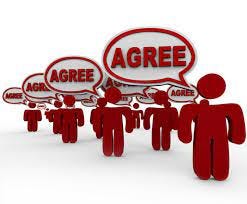Falsifying Consensus
What if your understanding of a consensus is manufactured?
Figuring out the truth is hard enough as it is, but what if we are also being manipulated by forces who benefit from presenting something as having consensus when it does not? How does that affect how we think about things and view the world?
In Venezuela, media is controlled by the government—which makes truth-seeking particularly difficult. But governments all over the world have been employing propaganda tactics to ensure that their citizens would buy into whatever messaging they are selling. Beneficial to the people or not.
I don’t mean to suggest that governments always have some sinister reason for wanting to amplify certain messages or getting their citizens to support them, but they are still engaging in intentional manipulations of the public they are meant to serve. When their deceit is inevitably found out, it leads to distrust (and unrest) that becomes nearly impossible to repair.
The media ecosystem also plays a substantial role in this. If all the publications you read only talked about dogs, you might begin to form the perception that perhaps cats are almost non-existent—and therefore their issues shouldn’t get much funding. If it only covered instances of aggressive dogs attacking humans, you’d perceive dogs as a threat and may form a fearful attitude towards them, even though they are indescribably lovely. If newspapers regularly ran polls that determined that most people prefer cats over dogs, as a human who’s subconsciously keen to fit in within the tribe, you might feel biased towards aligning in that direction too—even though clearly dogs are the superior creatures.
Think about how trends are created: If today every fashion magazine ran stories and photographic editorials proclaiming that bowties are making a comeback for men and how colorful leggings are all the rage for women…you’d soon see these “trends” reflected on the streets.
Where the dissemination of false consensus propaganda is particularly dangerous is in that many important decisions are often made on the basis of access to information about consensus. We also often lack the expertise in certain areas to make up our own minds and therefore are prone towards looking for mass consensus amongst experts. That seems like a reasonable position and tool to adapt. It may not be unanimous, one might say, but a large level of consensus can be used as a reasonable indicator of whether a particular position is valid.
People may agree, for example, to take a certain medication because MOST doctors believe it to be safe and effective. We might make certainly policy changes because, say, most environmental scientists believe something to be true about the earth’s state. Consensus on the safety of something like a new type of fuel or technology may mean the difference between adapting it or not.
But what if that consensus is being faked? What if only certain types of opinions are being taken into account? What if how the polling is being done is biased towards a specific outcome? What if there is no consensus at all amongst professionals or scientists and it’s merely being packaged this way to us? How do we know?
And, of course, even if consensus exists, how do we know that it’s right? There’s no shortage of consensuses throughout history that have led to countless deaths.
Now let’s examine how being aware of a particular consensus can affect individual thought:
What happens to a person who whose views appear to be supported by a vast majority around them? It gives them much stronger confidence that their beliefs are true and they become less likely to explore alternatives.
What happens to an individual whose views dissent from the consensus around them? This person might lose confidence in their own views and would also become far less likely to share them with others—even though that exploration might be vital towards getting at the actual truth.
What happens if, despite everything, the individuals on the other side of perceived consent does decide to speak out? Well, we all know what happened to Galileo during the 1633 Inquisition when he had to recant his scientific, evidence-based position that the earth revolved around the sun.
And, again: What if all of that is based on a false premise in the first place? What if the consensus presented to us isn’t even real? What harm can it cause to our society’s decision-making processes?
Psychologist have observed that those who are part of collectives tend to share the opinions of the group once internal consensus is reached. It is rare for someone within the group to dispute that consensus because they tend to overestimate how many people, both inside and outside the group, actually share that dominant opinion.
There’s something here that’s akin to the psychology of crowds. The sense of self (and responsibility) vanishes and is instead replaced a group, a leader, or ideal. That’s why “mobs” are at once so fascinating—and terrifying. You’re watching individuals who’d probably never engage in such behaviors on their own get completely overtaken by some mass hysteria.
So, given our uncertainty about reality, how do we proceed? 1) Don’t assume that most people share the same point of view as you. 2) Don’t assume that what’s being presented as consensus is true, or accurate. 3) Find people whose thinking, expertise, and knowledge you admire in specific areas and look at what they are saying.
Other ideas welcome. That’s why there’s a comment section. Fill it up.




I’m starting to think that most folks won’t believe the TV lies to them until they hear it on the news.
Another one: Learn to think critically. Even though our nature is rational, critical thinking is a skill. We are not born with it. We have to nurture it, develop it and, to some degree, master it. There are plenty of tools out there to start honing it.